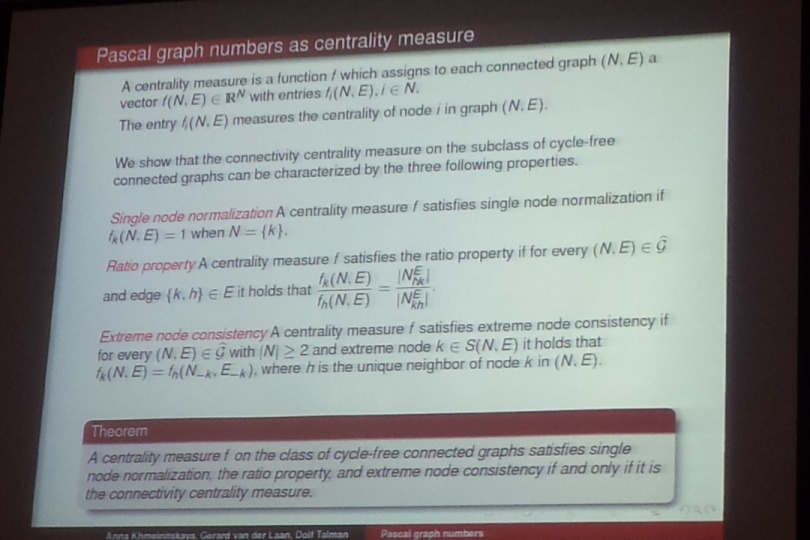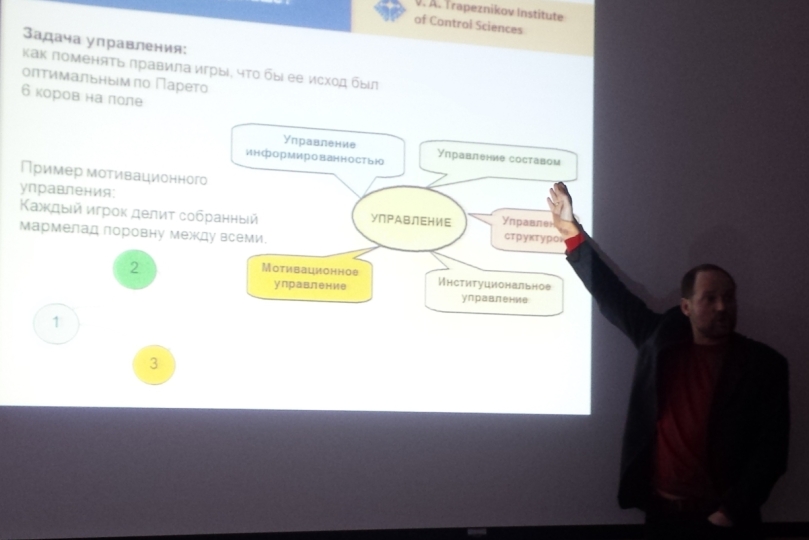On May 17 a research seminar on political economy took place at HSE. Alexei Zakharov (HSE) spoke on 'Valence influence in electoral competition with rank objectives'.
В старых версиях браузеров сайт может отображаться некорректно. Для оптимальной работы с сайтом рекомендуем воспользоваться современным браузером.
✖
- A
- A
- A
- ABC
- ABC
- ABC
- А
- А
- А
- А
- А
Regular version of the site
-
The Department
109028, Moscow, Pokrovsky Boulevard 11, T423
Phone: +7 (495) 621 13 42,
+ 7(495) 772 95 90 *27200; *27212.
Email: dhm-econ@hse.ru; shatskaya@hse.ru
Administration
School Head
–
Fuad T. Aleskerov
Manager
–
Oksana Kolotvina

Senior Administrator
–
Svetlana Shatskaya
Book
 New Centrality Measures in Networks: How to Take into Account the Parameters of the Nodes and Group Influence of Nodes to Nodes
New Centrality Measures in Networks: How to Take into Account the Parameters of the Nodes and Group Influence of Nodes to Nodes
Aleskerov F. T., Shvydun S., Meshcheryakova N.
CRC Press, 2022.
Article
Belenky A., Fedin G., Kornhauser A.
International Journal of Public Administration. 2021. Vol. 44. No. 13. P. 1076-1089.
Book chapter
In bk.: AIP Conference Proceedings. Vol. 2328: ICMM-2020. AIP Publishing LLC, 2021. Ch. 060001. P. 060001-1-060001-4.
Working paper
Zlotnik A., Kireeva O.
math. arXiv. Cornell University, 2020. No. arXiv:2011.14104v2[math.NA].
News

On April 12 a research seminar on political economy took place at HSE. Alexander Tarasov (HSE) spoke on 'Trade and the spatial distribution of transport infrastructure'.

On March 29 a research seminar on political economy took place at HSE. Constantine Sorokin (NRU HSE, NES CSDSI) spoke on 'Multidimensional free-mobility equilibrium: Tiebout revisited'.

On March 22 a research seminar on political economy took place at HSE. Roman Zakharenko (HSE) spoke on 'Endogenous Growth and Demographic Transition in a model of Cultural Transmission'.
March 22, 2016

On March 15 a research seminar on political economy took place at HSE. Alexei V. Zakharov (NRU HSE) spoke on 'Eqilibrium taxation under income uncertainty'.


Title: Generalization of binomial coefficients to numbers on the nodes of graphs

On March 1 a research seminar on political economy took place at HSE. Ruben Enikolopov (New Economic School) spoke on 'Social Media and Protest Participation: Evidence from Russia'.


Title: Serious games with kids:cows on magic field
February 17, 2016

On February 16 a research seminar on political economy took place at HSE. Alexander Yarkin (HSE) spoke on 'The Great Divergence Revisited: Industrialization, Inequality and Political Conflict in The Unified Growth Model'.
February 16, 2016

On December 22 a research seminar on ‘Mathematical Methods of Decision Analysis in Economics, Business, and Politics’ took place at HSE. Panos M. Pardalos (CAO, University of Florida, USA & LATNA, Higher School of Economics, Russia) spoke on ‘Constrained Subspace Classifier for High Dimensional Datasets’.
December 22, 2015
- About
- About
- Key Figures & Facts
- Sustainability at HSE University
- Faculties & Departments
- International Partnerships
- Faculty & Staff
- HSE Buildings
- Public Enquiries
- Studies
- Admissions
- Programme Catalogue
- Undergraduate
- Graduate
- Exchange Programmes
- Summer University
- Summer Schools
- Semester in Moscow
- Business Internship
-
https://elearning.hse.ru/en/mooc/
Massive Open Online Courses
-
https://www.hse.ru/en/visual/
HSE Site for the Visually Impaired
-
http://5top100.com/
Russian Academic Excellence Project 5-100
- © HSE University 1993–2024 Contacts Copyright Privacy Policy Site Map
- Edit

